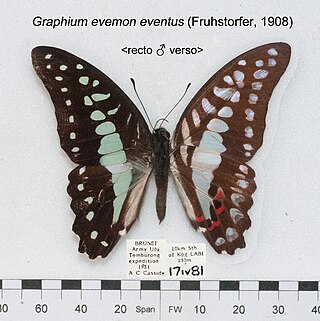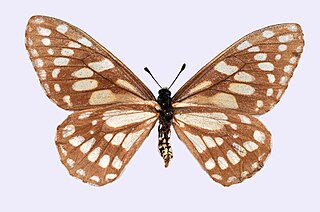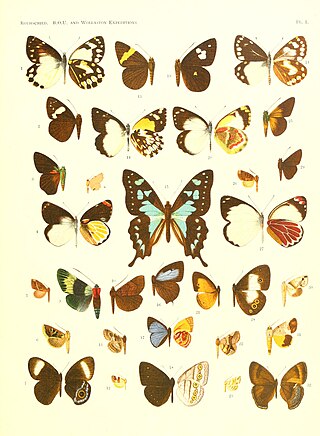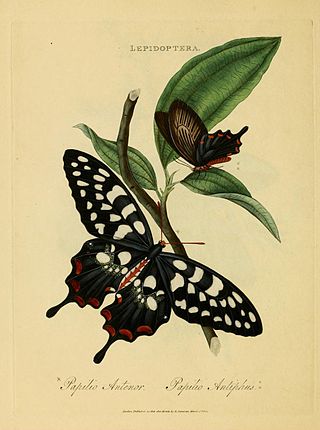
The Pieridae are a large family of butterflies with about 76 genera containing about 1,100 species, mostly from tropical Africa and tropical Asia with some varieties in the more northern regions of North America and Eurasia. Most pierid butterflies are white, yellow, or orange in coloration, often with black spots. The pigments that give the distinct coloring to these butterflies are derived from waste products in the body and are a characteristic of this family. The family was created by William John Swainson in 1820.

Swallowtail butterflies are large, colorful butterflies in the family Papilionidae, and include over 550 species. Though the majority are tropical, members of the family inhabit every continent except Antarctica. The family includes the largest butterflies in the world, the birdwing butterflies of the genus Ornithoptera.

Pachliopta aristolochiae, the common rose, is a species of swallowtail butterfly belonging to the genus Pachliopta, the roses, or red-bodied swallowtails. It is a common butterfly which is extensively distributed across south and southeast Asia.

Trogonoptera brookiana, Rajah Brooke's birdwing, is a birdwing butterfly from the rainforests of the Thai-Malay Peninsula, Borneo, Natuna, Sumatra, and various small islands west of Sumatra. The butterfly was named by the naturalist Alfred Russel Wallace in 1855, after James Brooke, the Rajah of Sarawak. The larval host plants are Aristolochia acuminata and A. foveolata. Adults sip flower nectar from plants such as Bauhinia. Rajah Brooke's birdwing is a protected species, listed under Appendix II of CITES, meaning that international export is restricted to those who have been granted a permit. It is the national butterfly of Malaysia.

Graphium doson, the common jay, is a black, tropical papilionid (swallowtail) butterfly with pale blue semi-transparent central wing bands that are formed by large spots. There is a marginal series of smaller spots. The underside of wings is brown with markings similar to upperside but whitish in colour. The sexes look alike. The species was first described by father and son entomologists Cajetan and Rudolf Felder.

Papilio buddha, the Malabar banded peacock, is a species of swallowtail butterfly found in the Western Ghats of India. The Government of Kerala declared it as the official Kerala state butterfly.

Graphium eurypylus, the great jay or pale green triangle, is a species of tropical butterfly belonging to the family Papilionidae.

Graphium evemon, the blue jay, lesser jay, or pale green triangle is a species of tropical butterfly found in India, Indonesia, and Malaysia.

Parnassius is a genus of northern circumpolar and montane butterflies usually known as Apollos or snow Apollos. They can vary in colour and form significantly based on their altitude. They also exhibit altitudinal melananism, a high-altitude adaptation. They have dark bodies and darker coloring at the base of their wings, which allows them to absorb solar energy more quickly.

Baronia brevicornis, commonly known as the short-horned baronia, is a species of butterfly in the monotypic genus Baronia and is placed in a subfamily of its own, the Baroniinae, a sister group of the remainder of the swallowtail butterflies. It is endemic to a very small area of Mexico, where the distribution is patchy and restricted.

Graphium stresemanni is a vulnerable species of butterfly in the family Papilionidae. It is endemic to the Indonesian island of Seram. It closely resembles the related Graphium weiskei, a more common species from New Guinea but has been treated as a distinct species. It is rare. The species was first described by Walter Rothschild in 1916.

Papilio cynorta, the mimetic swallowtail or common white banded papilio, is a butterfly of the family Papilionidae. It is found in Africa, including Sierra Leone, Liberia, Ivory Coast, Ghana, Togo, southern Nigeria, Cameroon, Equatorial Guinea, the Democratic Republic of the Congo, Angola, the Republic of the Congo, Uganda, Kenya and Tanzania.

Papilio hesperus, the black and yellow swallowtail or Hesperus swallowtail, is a butterfly of the family Papilionidae. It is found in Africa. It is monomorphic, meaning there is only one phenotype in the population of this species. The dorsal and ventral sides of its wings are practically identical due to the wing's translucence.

Papilio phorcas, the apple-green swallowtail or green-banded swallowtail, is a butterfly of the family Papilionidae. It is found in Africa.

Byasa adamsoni, or Adamson's rose, is a species of butterfly from the family Papilionidae that is found in Burma, Thailand, Laos, Cambodia and Vietnam.

Pachliopta antiphus is a species of butterfly from the family Papilionidae (swallowtails) that is found in Sumatra, Borneo and the Philippines.

Pachliopta phlegon is a species of butterfly from the family Papilionidae that is found in the Philippines.

Graphium illyris, the cream-banded swordtail, is a forest butterfly of the swallowtail family (Papilionidae). It is native to the Afrotropical realm.

Parides chabrias is a species of butterfly in the family Papilionidae. It is found in Brazil (Amazonas), Ecuador and Peru. It is a woodland species. The female flies slowly near the ground, whilst the male has a swifter flight and generally remains at a considerable height.

Graphium stratocles is a species of butterfly in the family Papilionidae. It is found in the Philippines.




















